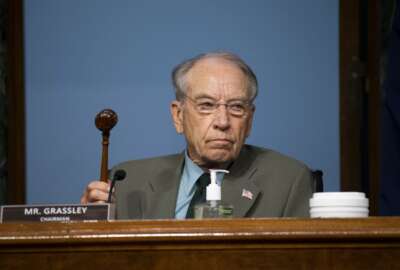

Hubbard Radio Washington DC, LLC. All rights reserved. This website is not intended for users located within the European Economic Area.
The Pandemic Response Accountability Committee (PRAC) is caught between Congress and the administration's requirements when it comes to the amount of data and t...
The alarm over Treasury Secretary Steve Mnuchin’s comments two weeks ago that the administration’s initial decision not to make public those companies receiving money under the Paycheck Protection Program is just the tip of the iceberg when it comes to recipient reporting under the $2 trillion stimulus bill.
The entire set of reporting requirements laid out by Congress in the Coronavirus Aid, Relief, and Economic Security (CARES) Act are at risk because the Pandemic Response Accountability Committee (PRAC) has not yet decided whether it will require any more detailed information from states and businesses beyond what is already reported in the USASpending.gov database.
Multiple sources confirmed the Office of Management and Budget has made it clear in its CARES Act implementation memo and during meetings with state and local government officials and federal oversight officials that the administration will only require the current reporting requirements under the Federal Funding Accountability and Transparency Act (FFATA) that feeds data to USASpending.gov.
Industry sources say OMB stated and interpreted rationale is FFATA is sufficient to provide oversight over more than $2 trillion in emergency spending.
But one source, who requested anonymity in order to talk about this politically sensitive topic, said FFATA falls short, leaving agencies and the PRAC caught between OMB’s memo and Congress’ specific requirements.
Sources say FFATA doesn’t meet CARES Act requirements for two main reasons:
One federal oversight source, who also requested anonymity because they didn’t get permission to talk to the press, said OMB made it clear very quickly that they didn’t want to burden state and local governments with more reporting requirements.
“The OMB memo specifies all award data should be uploaded within two weeks of an award, but there is no data element for each award that indicates whether it’s COVID-19 or CARES Act related spending,” the source said. “The memo talks about the utilization of disaster emergency fund code (DEFC), which is on the financial side so they are dealing with the actual financial reporting, while on the award side they only will total obligations instead of actual expenditures against those obligations. There will be a need for some analytics from that live data to get what Congress is asking us to report on.”
The source said they were “surprised” by OMB’s memo and how it addressed recipient reporting because many in the oversight community thought the administration would build upon Recovery.gov lessons and take advantage of a centralized portal.
A request to OMB seeking clarification of the reporting requirements for recipients or future reporting requirements came back with only a brief statement.
An OMB spokesman told Federal News Network, “OMB is working with the PRAC and agency IGs to ensure proper reporting and transparency of CARES Act relief legislation.”
Sean Moulton, a senior policy analyst at the Project on Government Oversight (POGO) and a former analyst at OMBWatch where he developed the first transparency website for the Recovery Act called fedspending.org, said while it’s a good sign to see how fast the PRAC has moved to name an executive director and a deputy, the oversight board is struggling to get to where Congress told them they needed to be around recipient reporting.

“The biggest impediment is fact that OMB has come out and unexpectedly said we don’t think we need to collect any new information here. OMB said to make a few changes to existing spending tracking and that will be fine,” he said. “That goes directly against what Congress said it wanted. Congress wanted recipient reporting over $150,000. I don’t think a little reporting was too much to ask.”
Moulton said what Congress outlined in the CARES Act is anything but burdensome. He said it’s five or six data elements that can be done through a series of paragraphs and only for recipients receiving more than $150,000, meaning there would be no burden on most small firms.
“The two main excuses we keep hearing don’t makes sense. This level of data collection is not just useful for [an] organization like us or for Congress, but this is useful for agencies who will be overseeing these programs for years,” Moulton said. “They need to figure out how best to adjust their programs, how to improve loans, which ones were more effective to create jobs. You may wind up spending years throwing money at a problem and not getting the results you would if you had data to course correct.”
The agency oversight source said while there are ways to drill down into USASpending.gov to achieve some level of transparency, it will not compare to the recipient reporting during the Recovery Act.
“My wish is for the data to be centrally collected and we could use an API to pull the data we want,” the source said. “Instead, what we are being left with is trying to figure out individual funding streams, how to account for money and spending internally, and whether or not they are using a new catalog for domestic federal assistance number. All of us are having to do internal work, which is fine and it’s something we are used to doing, but it’s not helping with the overall transparency of the spending.”
POGO, which hasn’t talked to OMB about the reporting requirements, wants to create a CARES Act website of its own with data visualization and graphics.
Moulton said POGO received a couple of hundred thousands of dollars from the Arnold Foundation and is looking for additional funding to hire a contractor to help create the portal.
Mnuchin’s comments to Congress at a hearing earlier in June that the names of loan recipients and the amounts are “proprietary information,” may be the spark to move the administration off its current stance.
While he claimed the information is confidential, ethics advocates and some lawmakers see the move as an attempt to dodge accountability for how the money is spent.
Treasury and the Small Business Administration has since walked back that viewpoint, announcing late last week that it would make recipient reporting for any businesses receiving more than $150,000 in PPP more transparent.
Before Mnuchin’s comments, lawmakers already were worried about the administration’s requirements for recipient reporting.
Rep. Virginia Foxx (R-N.C.), and four other lawmakers sent a letter to Michael Horowitz, the chairman of the Council of the Inspectors General on Integrity and Efficiency on May 29 supporting the use of existing standards and data resources.
In the letter the lawmakers asked CIGIE to make sure the PRAC considers using existing data standards and platforms as well as develop a “robust recipient reporting framework that incorporates all award types and enables easy utilization by large and small businesses without creating undue burden.”
Other sources in the federal oversight community said there is a lot of concern and anxiety about OMB’s stance since they say it undermines Congress’ intent and flies in the face of all the lessons learned by the Recovery Accountability and Transparency (RAT) Board to oversee the Recovery Act spending.
Those concerns came to light during a PRAC town hall and listening session on June 3.
Kinney Poynter, the executive director of the National Association of State Auditors, Comptrollers and Treasurers (NASACT), said there are two major concerns that the PRAC should address immediately.
“A comprehensive listing of all federal funds provided to the states should be prepared and distributed. This listing should be detailed to show the total dollars received by each state and further broken down by the amount received from each federal program by Catalog of Federal Domestic Assistance number,” she said. “Several key decisions need to be reached regarding the $150 billion of Coronavirus Relief Fund (CRF), including: Will these funds be subject to the single audit? If no, how will compliance requirements be independently tested? What are states’ responsibilities over the funds that are passed to local governments or other subrecipients? Are states responsible for repayment of these funds in cases where a subrecipient did not spend the funds appropriately? How will CRF funds be reported to the public facing website and to the PRAC?”
Poynter said the Recovery Act provided a good roadmap for the CARES Act.
“One of the key lessons learned from [Recovery Act] implementation was the need for the federal government to ‘speak with one voice.’ Different guidance from different federal agencies is not efficient and will decrease overall accountability over the funds,” Poynter said.
During the town hall, Horowitz said the PRAC fully understands its role in promoting oversight and transparency.
“Through the PRAC as well as through the audits, reviews and investigations conducted by individual IGs, we are working tirelessly to meet that effort,” he said. “In order for us to be successful, obviously, we need to hear from stakeholders. They can provide important insight into the areas we will be overseeing, and to get your expertise, your views and your thoughts about how the pandemic response is being undertaken and how the federal government is meeting the challenges that it has been called upon to meet in these challenging times.”
Then on June 17, CIGIE released a new report that includes input from 37 agency IGs about the top management challenges agencies face in overseeing the CARES Act spending. At a high level, the challenges included financial and grants management as well as IT and security concerns.
And recipient reporting came up several times during the individual responses from large and small agency IGs.
“Several OIGs identified concerns about receiving timely and accurate data. For example, the Department of Education OIG stated that the agency should look for ways to improve data quality and ensure that CARES Act grant recipients and subrecipients report data that is accurate and complete,” the report states.
POGO’s Moulton added what seems to be getting lost in this discussion is Congress expected some level of unprecedented transparency of spending and so far it’s unclear if that will happen at the federal level.
He said he’s been in touch with some of the congressional staff members who drafted the CARES Act oversight requirements and they mirrored them off the Recovery Act.
“I think there is a sense on both sides of the aisle that while the Recovery Act had its challenges, it was pretty good with transparency and accountability and they wanted to use that as starting point,” Moulton said. “They made some improvements in the language and felt they didn’t have to spell out everything they needed to get because it was modeled after the Recovery Act. They used the same structure and made changes based on better technology to get to a similar result. Unfortunately it looks like that’s not what’s playing out.”
Sources say at a recent National Governor’s Association call, at least one state is planning to meet the reporting requirements to the letter of the CARES Act law and two others are creating a data dictionary.
But one of the biggest challenges for all states, according to people who were on the call, was the lack of consistency in initial reporting guidance from agencies. Sources say recipients are forced to constantly review websites to find information across programs, agencies and sub-agencies.
“While we appreciate OMB’s continued support in reducing administrative burden, award recipients are ultimately accountable to the statutory requirements and memoranda do not take precedence over statute,” one attendee said. “The lack of clear guidance on reporting makes advance preparation for the reporting process difficult at the state level. States strive to comply with the requirements of the CARES Act and avoid any audit findings. We view ourselves as a partner with the federal government. Our success is their success.”
As for the PRAC, Robert Westbrooks, the executive director, acknowledged they are at the beginning stages of the data collecting and reporting effort.

“There are gaps today, but what the reporting structure is today is not the end of the story. That’s important to recognize. We are working on an ongoing basis to close these gaps, and what that looks like is yet to be seen,” he said. “In July, the PRAC will receive the first set of COVID-19 spending data, and at that point we will be able to see full extent of statutory reporting responsibilities not being met. We are working ongoing basis with National Association of State Auditors, Comptrollers, and Treasurers and its COVID-19 Accountability Working Group, and many others.”
The PRAC also plans upgrade its current website and its current set of analytical tools. The committee currently is reimbursing the Postal Service inspector general for technology services and support. Westbrooks said the PRAC plans take over the management of its technology and hire an executive to lead the IT effort.
On May 29, the PRAC released a solicitation under the Alliant 2 governmentwide acquisition contract for website, data and analytics management services. Westbrooks said the PRAC hopes to have the contract in place by mid-July to begin to manage and populate the current website with more and better data and tools.
Congress allocated $80 million for the PRAC for people, technology and other needs.
Kathy Tighe, a retired Education Department IG and who is a senior advisor to the PRAC, said the committee is working with the Treasury IG to set up a separate recipient reporting portal for the Coronavirus Relief Fund, similar to what the Recovery Act used. She said new guidance will be going to state, local and tribal governments and the Treasury IG is in direct conversations with the National Association of State Auditors, Comptrollers and Treasurers about what the portal would look like.
Westbrooks said he wants to make sure oversight groups, the public and others understand that the PRAC is just getting started and recipient reporting will evolve over time as the data comes in.
“One of purposes of the OMB PRAC coordination process is so we have a whole of government consistency. There has to be consistency,” he said. “We are working with Treasury too, but it’s that weekly OMB coordination process that is the vehicle to ensure consistency. We also work closely with IG members and with HHS, GSA and other agencies. We are early in the process. We don’t have it all figured out now. We are working through it to ensure consistency.”
Copyright © 2024 Federal News Network. All rights reserved. This website is not intended for users located within the European Economic Area.
Jason Miller is executive editor of Federal News Network and directs news coverage on the people, policy and programs of the federal government.
Follow @jmillerWFED



